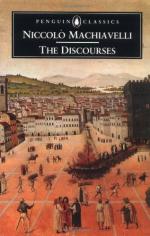
|
| Name: _________________________ | Period: ___________________ |
This quiz consists of 5 multiple choice and 5 short answer questions through Book Three, The Examples of Rome's Great Men, Sundry Remarks on Strategy, Tactics, New Devices and Discipline, Administrative Posts, Administrative Methods: The Rival Claims of Severity and Good Fellowship.
Multiple Choice Questions
1. Reviewing earlier chapters of "The Discourses", why would Machiavelli consider long wars in foreign lands important?
(a) Because long wars give Nobles an opportunity for Nobles to encourage Plebes to perform glorious works for the Republic.
(b) Because Machiavelli suggested long wars helped to keep Republics united.
(c) Because Machiavelli considers fighting wars and building empires to be signs of virtuous leaders.
(d) Because long wars assures that poverty will be maintained for everyone in the Republic.
2. When Machiavelli writes, "For sometimes of necessity our judgment is the truth, as human affairs are always in motion, either ascending or descending," what is he writing about what he believes about truth?
(a) Truth is not as important as the people you make relationships with.
(b) Truth is irrelevant to the reason for making judgments.
(c) Machiavelli considers truth to be relative.
(d) You can't make sound judgments without having a firm grasp on the truth.
3. What was an example from Roman history that Machiavelli used to suggest the Plebes possesses greater wisdom than Nobles?
(a) The willingness of the Plebes to go to war for the glory of Rome.
(b) The failed attempt of the Nobles to put Plebes of ill-repute to selection for Tribunes.
(c) A time when the Plebes could have chosen all Plebes for four Tribunes, chose, instead, four Nobles because they recognized the weaknesses of Plebes filling those offices.
(d) The Magistrates decision to delay battle against the Samnites.
4. How does Machiavelli expect a city can keep its freedom after a weak Prince follows an excellent Prince?
(a) Only if the city does not fall into war with a more virtuous city.
(b) Only if the citizens ignore the weak Prince and organize themselves to retain virtue.
(c) Only if administrators conspire to act with the virtue of the excellent Prince.
(d) Only if a Prince with the virtue of the excellent Prince follows the weak Prince.
5. What did Machiavelli identify as the cause of conspiracy against a hereditary Princes?
(a) Less powerful people desired the power of the Prince.
(b) They degenerated from their fathers, and surpassed others in sumptuousness and lasciviousness and in every other kind of delight.
(c) The general population became dissatisfied with the distribution of wealth.
(d) The larger population of citizens became unhappy with the the political preferences of the Princes.
Short Answer Questions
1. What did Roman historian Livius call Necessity?
2. What does Machiavelli examine in Chapter 1 of Book 2?
3. Who does Machiavelli credit with protecting Rome from the ambitions of the Tribunes?
4. What did Machiavelli report led gatherings of people to make laws?
5. How does Machiavelli predict a citizen will conduct himself if he is not punished for his misdeeds because of his reputation for doing good deeds, according to Machiavelli.
|
This section contains 582 words (approx. 2 pages at 300 words per page) |

|




